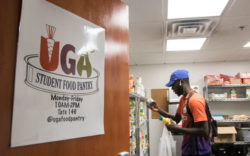One of the best features of a farmers’ market is that food is available on several levels of immediacy. If you arrive hungry, there’s usually a vendor ready to feed you. Rows of produce, breads and other goodies will supply your week. For the enterprising home gardener, there’s usually a table or two that sells potted plants.
Tucked into the back corner of the blacktop at the West Broad Farmers Market, Good Roots offers visitors organically grown vegetable, herb and flower seedlings. And if you stop for a minute to chat with the folks at Good Roots, you’ll soon learn that your new tomato plant is the product of a program that aims to help isolated members of our community find a source of independence.
A training and production program provided through the Athens-based Multiple Choices Center for Independent Living, Good Roots trainees learn to grow and propagate plants from seeds and sell them to local customers.
“Good Roots originally sought to help disabled individuals in rural areas,” says program founder Doug Hatch. Physically and developmentally disabled people living in rural areas can get “stuck” after high school, says Hatch, because many can’t find jobs or live on their own.
Gardening, however, is highly accessible. “If you’re stuck at home, you can tend seedlings,” Hatch says. “That was the germination of the program.” Since the program’s inception in 2013, it has served individuals with a wide range of disability—visual and hearing impairment, cerebral palsy, paralyzation and autism.
Good Roots tackles the issue of isolation in two ways: Participants have a regular opportunity to socialize with other trainees and market visitors, and they gain a marketable skill that can boost their incomes or help them feed themselves. Interaction and cash, says Hatch, are necessary for independent living.
The day-to-day operation is handled by trained botanist Stephanie Bergamo. Hatch calls her a plant “genius,” and she relays the technical skills of cultivating plants through tangible, easy-to-mimic advice.
Bergamo’s approach to gardening is half science and half art. “They learn to listen to the plants,” she says. By that, Bergamo means observing the needs of the plant by sight, touch and smell. “It’s an ongoing practice to keep plants well-fed and well-lit,” says Bergamo, so her trainees pay close attention to whether a plant needs more water, more or less sun exposure, and when it’s time to transplant seedlings into bigger containers.
Beyond the garden, observation and patience translate into trainees’ interactions with other people. Though the Good Roots program is not designed to be therapeutic, Bergamo and Hatch acknowledge that learning to work with plants changes trainees for the better.
After two years of working with a group of trainees at the Advantage Jackson Creative Center, they watched as cliques dissolved and camaraderie grew. “We worked on a ping-pong table, and when we started, the guys were on one side and the gals were on the other,” says Bergamo. As some individuals picked up skills more quickly, they turned to help one another despite past conflicts.
The goal of the program is for trainees to be able to grow plants from seed on their own, says Hatch. Some trainees have graduated from the program and now grow food for their families. Others continue to work with the program to sell high-quality, Certified Naturally Grown seedlings at West Broad.
“If you get one of our tomatoes, it already has a strong root system,” Hatch says. “It’s ready to plant.” Along with four or five types of tomatoes, they have jalapenos, banana peppers, eggplant, squash and a number of summer herbs. The group will be back at West Broad in September with their first round of fall seedlings.
If you’re in the market for a new planting, you don’t have to wait until September. Good Roots sells seedlings year-round at the Multiple Choices Center on the Eastside, at 145 Barrington Dr.
Bergamo believes in the quality of their plants and the good the program does for trainees. “We see a phenomenal change in their outlook and self-esteem,” she says, “and they learned it by doing and getting their hands dirty.”
Like what you just read? Support Flagpole by making a donation today. Every dollar you give helps fund our ongoing mission to provide Athens with quality, independent journalism.










